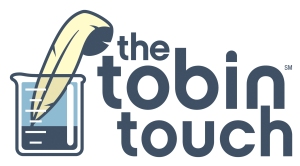
I attended a session at the AMWA annual meeting today on marketing for independent healthcare communicators (a fancy way of saying freelance medical writers). Deborah Gordon (GordonSquared) and Brian Bass (The Accidental Medical Writer) gave two fantastic talks about the importance of branding your freelance medical writing/editing business and the power of passive marketing. Deborah stressed the importance of branding your freelance business in a way that reflects who you are and what you stand for. Brian talked about building your reputation, then delivering on your marketing promises and gently reminding your clients about the value you bring.
I’ve often written about how trust is an essential part of my freelance medical writing business. I work with individual basic and clinical researchers who must trust me enough to hand over their data or their “next big idea” so that I can help them communicate it clearly – to journal peer-reviewers, to the NIH, etc. So to get new clients, I have to be able to assure them of my trustworthiness and my capabilities at the start. This is even more difficult because I work remotely, and usually am unable to meet face-to-face before a project starts.
So it became essential for me to develop a brand for my company, one that reflects not only trustworthiness, but also professionalism, experience, thoughtfulness, dedication, and attention to detail. I decided to rely on online marketing rather than direct mail or other print tactics, and I turned to a professional designer to develop my logo and website, and I did a lot of research of other medical writers’ websites to figure out what I wanted to say and the best way to say it. But my company website could only do so much to communicate a concept like trustworthiness (unless the color blue has a calming effect or something), so I also started a blog as a way to showcase how I think, what I think, and hopefully give potential clients a better idea of who I am and why they might trust me with their research.
So as Deborah was giving her talk on branding, I found myself nodding in agreement. By creating a brand and then getting it out there through my website, my blog, Twitter, Facebook, LinkedIn, and even my AMWA freelance listing, I have been able to bring in new business, and do it fairly passively. In the past year, I’ve landed 3 clients who have found me through my blog because they liked what I had to say about one topic or another and many more people who contacted me because they liked my website. Even better, more than a few people here at AMWA blurted out “Oh, the Tobin Touch!” after I told them my last name. Which means that creating and cultivating my brand seems to be paying off.
Brian also introduced me to the idea of relationship marketing, which again had me nodding. Relationship marketing involves building your reputation and getting your name out there, marketing yourself whenever you can—though not with a hard sell, but with passive marketing. For example, each time Brian gives a talk for AMWA, he builds his reputation because his name is being seen and associated with a respectable group. Same goes for posts on LinkedIn or articles in the AMWA Journal. He may not be gaining clients directly, but when more people recognize his name, they may be more likely to remember him when they or someone they know is looking for a medical writer. You never know where opportunities will come from, and somewhere down the line, your name might get passed on to the right person. Keeping your name and brand visible and your reputation intact are critical to generating new freelance business.
But just building a brand and a reputation for your business and getting exposure is not the end of relationship marketing. You absolutely must deliver on what you have promised with your marketing. For me, I know I have delivered on my marketing promise if my clients feel that they were able to trust me with their data, that I understand their point of view and what they are trying to say, and that I helped them convey their thoughts clearly.
Another great piece of advice that Brian gave was that we should remind clients after the project is over about the value that we as medical writers brought to them. Brian wants his clients to look at his invoice and say, “Look how easy Brian made my life, he’s worth every penny.” Reminding your clients of your value doesn’t need to be overt; he suggested that in the cover letters you send with your invoices, you should add a short note reinforcing how you contributed and that you are looking forward to the next project. He also stressed the importance of helping your clients—in whatever way you can—and following up with emails, checking in often to see if you can help, and sending holiday cards to each of your contacts. By cultivating relationships with individuals, not companies, you are more likely to expand your business as individuals move from company to company. But above all, deliver on the promise of your relationship and prove your value.
A lot of great advice from some of the best in the medical writing freelance world!
